Wander among the Sea of Flowers in the Most Beautiful Spring Season
Spring is the ideal time to visit China! What are your favored destinations to catch the beauty in SPRING? What is your style to fully feel the vitality of spring? Sichuan Province, praised as the Land of Abundance, is no doubt one of the best regions with many stunning destinations to be visited in spring. So we’ve specially designed Sichuan Spring tour making you catch the best of spring in Sichuan! This 8-day tour takes you get into the most beautiful village in China with pear flowers blooming all over the Tibetan-styled village, as well attend the Jinchuan Snow Pear Festival to immerse into the sea of flowers, and of course, you won’t miss the special experience with Jiayang Steam Train to travel through golden rape flowers before marveling at the largest stone Buddha in the world.
Best Time Notice: The best time to view all kinds of flowers like peach flowers, pear flowers, rape flowers blooming at the same period is from early March to middle April. Please tell us your travel date and ideas before booking this tour. Our professional travel consultants are local based in Chengdu and Sichuan and they are glad to help you adjust or customize the tour for you. Travel with us now!
After breakfast, your driver and guide will pick you up at your hotel in Chengdu downtown. The following journey will be a scenic driving from Chengdu to Mount Siguniang, about 205 kilometers away. To enrich your experience on the way, you’ll pay a visit to Dujiangyan Irrigation System, a 2000 year-old living world heritage and ecological engineering feat. The system is still working to irrigate Chengdu Plain and it’s the real reason why Chengdu is called “the Land of Abundance”. Visit the three main parts of Dujiangyan Irrigation System including Yuzui Bypass Dike, Feishayan Floodgate, Baopingkou Diversion Passage, and be amazed by the wisdom of ancient Chinese.
After the visiting, continue your driving to leave the flat Chengdu Plain - vast golden rape flowers in full blossom decorated the green land in this beautiful season and then travel onwards and upwards through the sea of clouds of Balang Mountain (altitude: 4,532 meters) where you can also enjoy breathtaking view of the snow-capped Mount Siguniang in distance. After that, you’ll arrive in Siguniangshan Town (altitude: 3,200 meters). Have a good rest and stay overnight in this town.
 Dujiangyan Irrigation System
Dujiangyan Irrigation System
 Balang Mountain Sea of Clouds
Balang Mountain Sea of Clouds
 Mount Siguniang Appearance from Maobiliang
Mount Siguniang Appearance from Maobiliang
After breakfast, begin your interesting hiking along Changping Valley, located in the middle of three valleys and being the nearest valley to catch the gorgeous appearance of Mount Siguniang. With 29-kilometer long, Changping Valley is a mature valley designed with sightseeing bus, plank road, hiking trail and horse riding. The spring of Changping Valley comes slowly and everything here is waiting for a recovery after the long cold winter.
Walk several hundred meters from your hotel to the tourist center of Changping Valley, then take a sightseeing bus to Lama Temple (5km), a Tibetan-style monastery which belongs to the Gelug Sect. This is the starting point of your today’s hiking. The following hiking is composed of two parts - hiking on the plank road and hiking from the ending of the plank road to Muluozi. In the first part, you will see solemn monastery, waterfalls, deep valleys, ancient withered trees standing in lakes; and in the second part, you’ll walk through wild forests, follow the walking trails along the clear streams to chase some landscape you have never seen - sea buckthorn forest, red stones arrayed by nature, peaks like camel, mushrooms, pure plateau lakes reflecting the giant peaks, flocks and herds leisurely wandering, snow-capped Four Girls Mountains, magnificent glacier…you will return to Lama Temple after reaching Muluozi. The whole hiking needs about 8 hours. Last, take a sightseeing bus to go out.
Important Travel Tips: 1) The scenic area also provides horse for transferring luggage and riding in case you get tired of walking; 2) You can decide how long you want to hike based on your physical condition at that time; 3) Altitude changing: the altitudes range from 3,200 meters to 3,670 meters along the way. Try to avoid strenuous activity to prevent from possible high altitude sickness. 4) You’d better bring sun cream, sun glasses to protect yourself from strong sunlight; 5) There is no any restaurant in the valley, so you have to bring some food and drinks with you.
 Changping Valley Spring Scenery
Changping Valley Spring Scenery
 Lama Monastery at Changping Valley
Lama Monastery at Changping Valley
 Changping Valley Hiking in Spring
Changping Valley Hiking in Spring
After breakfast, you’ll be transferred from Mount Siguniang to Danba County (about 2.5 hours’ driving). On the way, you’ll make a stop to visit Zhonglu Tibetan Village, with a meaning of “A Fantastic Place Looking Forward to” in Tibetan language. This primitive village has many ancient watchtowers for a witness Danba “A Place of Hundreds of Ancient Watchtowers”. In this amazing spring season, the whole world turns into a fairy-tale world like a pure snow lotus blooming at the foot of Moerduo Mountain. Reaching a higher point and you’ll have the chance to look down the whole village - traditional Tibetan houses in white, red and black settled harmoniously among emerald lush trees, countless ancient towers standing distinctly above the trees, elegant white pear flowers decorated the whole mountain slope level by level, a pastoral painting unfolding before your eyes. Walk among the fertile farmlands to smell the fragrance of spring.
In this afternoon, you are going to visit Jiaju Tibetan Village, honored as the most beautiful village in China by Chinese National Geographic. In Danba County, there are over 180 Tibetan villages, while Jiaju is the best example with well preserved Jiarong Tibetan culture. Standing at the observation decks and capture panoramic scene with numerous Tibetan stone houses settled level by level from the deep valley to the foot of Kapama Mountain, and peach flowers and pear flowers in full blossoming, looking like beautiful girls showing their elegance and vitality. Hike down from the observation deck to have a clearer look at the featured Tibetan houses surrounded by white and pink flowers under the blue sky. You can see many locals dressed in traditional Jiarong Tibetan costumes still keep their unique Jiarong Tibetan culture in such quiet and beautiful village. If you like, you can pay a visit to one of the Tibetans’ home to have a deep understanding about their house construction, decoration, real life and other Jiarong customs.
After the tour, drive to Danba County and stay overnight there.
 Jiaju Tibetan Village in Spring
Jiaju Tibetan Village in Spring
 Zhonglu Tibetan Village in Spring
Zhonglu Tibetan Village in Spring
In this morning, you’ll be escorted to Jinchuan County for in-depth flowers appreciation (about 96km with 2.5 hours’ driving). Called “the Jiangnan Area of Aba Prefecture”, Jinchuan County has the largest-scale snow pear planting area in the world. From late Ming and early Qing Dynasty, the Jiarong Tibetans here began to grow cold-resistant snow pear trees at the altitude around 1800 meters. Every year in the middle to late March, the Snow Pear Flower Festival is going to hold here. Jinchuan welcomes you to attend this grand natural festival with her best scenes!
When driving to Jinchuan, you’ll find yourselves traveling amid the overwhelming pear blossoms on both sides of the road. Get to the most famous snow pear photography site - Sha’er Town, a idyllic paradise surrounded by mountains by the Jinchuan River. Reach atop of Shenxianbao Viewing Platform, the best location to capture the full scene of the charming village. The Tibetan houses in red and black dotted on the open land, hundreds of thousands acres of pear trees displaying the sunning beauty with fluttering their white petals and rosy pistils stretching far to the end of the village, local Tibetans are working on the green farmlands, white clouds floating in the blue sky...this is a fictitious land of peace. Enjoy some leisure time to walk through the snow pear trees and encounter the most beautiful spring. You can enjoy more in Ge’er Town to see a world with white snow pear flowers.
After this visual feast, drive back to Danba County.
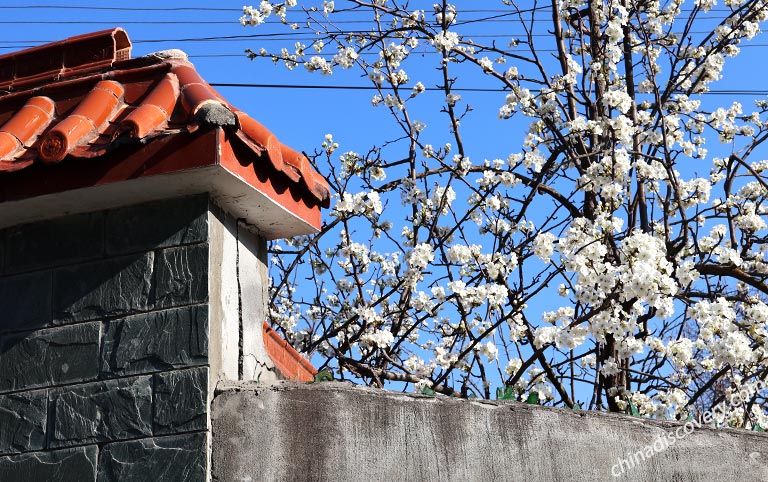 Jinchuan Pear Flower Blossom in the Tibetan Village
Jinchuan Pear Flower Blossom in the Tibetan Village
 Jinchuan Pear Flower Panoramic View from Shenxianbao Viewing Platform
Jinchuan Pear Flower Panoramic View from Shenxianbao Viewing Platform
After breakfast, it’s time to say goodbye to the beautiful land and drive about 2.5 hours to visit Tagong Grassland and overlook the snow-capped magnificent Yala Mountain (5,884 meters) in a distance. Enjoy the harmonious scene with numerous yaks and sheep grazing on the golden to green grassland decorated with flourishing seasonal wild flowers under the blue sky. And if you are interested, you can rent a horse to explore happily with a visit to herder’s home (pay the expense on your own). The famous Tagong Monastery in glamorous golden is conspicuous on the top of the grassland and looks so sacred backing the azure canopy in spring months. Tagong means “A Land Favored by Bodhisattva” in Tibetan language and a legend goes that Princess Wencheng on the way to Lhasa for her wedding to the Tibetan King, she was attracted by the breathtaking scenery of Tagong and left the life-sized statue of the Shakyamuni at the age of 12 here. Reputed as “Little Jokhang Temple”, Tagong Monastery belongs to Sakya Sect with a history over 1,000 years. You can go inside and see the pilgrims worshiping.
Later, say goodbye to this beautiful grassland and you’ll get into “A World of Light and Shadow” to totally immerse into “Photographers’ Paradise” in Xinduqiao. On the way, wild flowers blooming by the winding rivers, green poplar forests showing their vitality on the two sides of the road, Tibetan-styled houses scattered among the idyllic farmland, yaks and goats roaming freely...you can make a stop to enjoy the pastoral life of Kangba Tibetans. Next, move eastwards with a scenic driving to pass Zheduo Mountain at an altitude of 4,298 meters through many bends on the way, and feast your eyes with countless breathtaking snow-capped mountain sceneries. You have the chance to capture the panoramic view of Mount Gongga with many peaks linking in a row above sea of clouds. Finally, you’ll arrive in Kangding for accommodation.
 Yala Snow Mountain Morning View from Tagong Monastery
Yala Snow Mountain Morning View from Tagong Monastery
 Xinduqiao Spring Scenery
Xinduqiao Spring Scenery
On this day, walk around Kangding downtown area to absorb the romantic atmosphere with famous melody rising in your mind - “horses run on the mountain, and there is a cloud. The moon brightens the city of Kangding. The moon, the crescent moon, brightens the city of Kangding...”.
Then, it’s time to say goodbye to this lovely city and you will be transferred to Leshan City with 3.5-4 hours’ driving. Stay overnight in Leshan.
After breakfast, you will drive about 1.5 hours from Leshan city to Qianwei County for the unique Jiayang Steam Train experience.
Jiayang Steam Train is a passenger steam train that is still operating in China. Built in 1958 and with a total length of 19.8 kilometers, it is reputed as "the living fossils of the industrial revolution" and "out-of-print landscape of the industrial revolution". What makes Jiayang steam train so famous and special is not the train itself but the vast terraces of rape flower. When every March of Spring season comes, this long and narrow valley is dyed golden with rape flowers, and the old green leather steam train always arrives as scheduled, spraying white steam with black smoke, slowly and steadily crawling across the field, climbing up the hillside, through the tunnel, passing by the farmhouse, slowly and carelessly sailing into the sea of golden canola flower. Your tour guide will take you to board one of the steam train, ride through terraces, forests and villages to upper destination of the railway, then ride the same way back. During the train trip, you will have several chances to go out of the train to take photos.
After the train experience, go to marvel at the UNESCO World Heritage Site - Leshan Giant Buddha which is the largest and tallest stone-carved statue of Buddha in the world. It was carved during AD713~803 on a mountain rock cliff by the river, with its head reaching to the mountain top and its feet standing next to the river. The total height is 71m; while the head is 14.7m high and 10m wide, ear is 7m high, 28m between knees and insteps. Its insteps can hold over a hundred people. You may be wondering why such a giant Buddha was built? It is said to have been built to calm the turbulent waters that plagued passing boats and killed many people each year in ancient time. On the right cliff of the Giant Buddha, there is a plank road built along with the Giant Buddha. From the top to foot, the plank road has nine turns, thus it’s called Nine Bends Plank Road. The widest part of the road is 1.45m and the narrowest part is only 0.6m, and there are 217 stone steps in total. You will walk down the plank road to the feet of the Giant Buddha for a closer view.
After the tour, drive to Chengdu (about 2 hours).
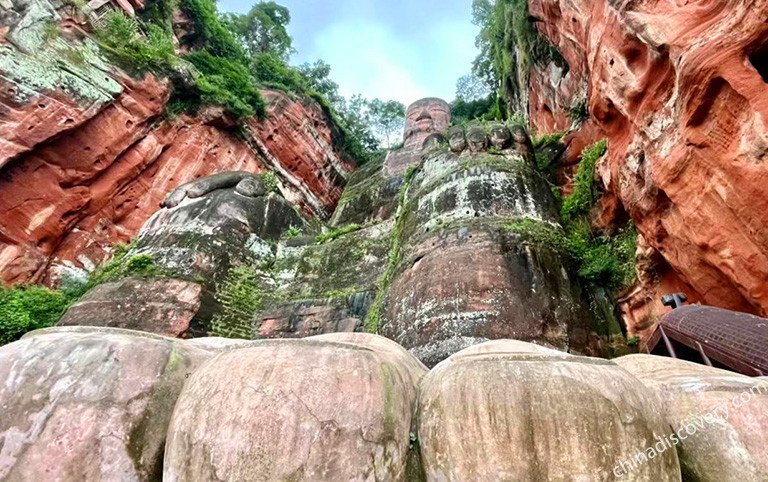 Look up at Leshan Giant Buddha from its foot stage
Look up at Leshan Giant Buddha from its foot stage
 Jiayang Steam Train passing through canola flowers in mid March
Jiayang Steam Train passing through canola flowers in mid March
This morning you will make a stirring visit to Chengdu Research Base of Giant Panda Breeding which is not only the most important panda scientific research center, but also dwelling home for more than 100 Giant Pandas. Walk at leisure through the bamboo framed paths, and closely observe giant pandas of different ages eating bamboos, playing with each other, tumbling, climbing trees, etc. Don’t miss the chance to watch female pandas nursing their cubs in the nursery rooms. There is also a very informative Panda Museum for you to learn more scientific facts about Giant Pandas.
Following the pandas, you will be taken to a hidden spiritual Buddhist temple in the hustling downtown of Chengdu - Wenshu Temple. Marvel at the exquisite Buddhist architecture, soak in the reverent atmosphere, and wander on the peaceful paths.
Chengdu is famous for its relaxing and leisure pace throughout China, which will be proved after a stay in People's Park. Sit down, order a pot of Chinese tea, make a casual chat with your friends and watching locals indulging themselves in different kinds of folk entertainment - napping in a lively tea house, playing mahjong, disco dancing, neck massage, ear cleaning… Next is an impressive trip to the famous Jinli Old Street. Time steals away from you quietly while walking on the lively streets which are full of delicious local snacks, delicate artifacts, interesting folk shows, etc.
At the end, your guide and driver will escort you to catch your flight/train to next destination!
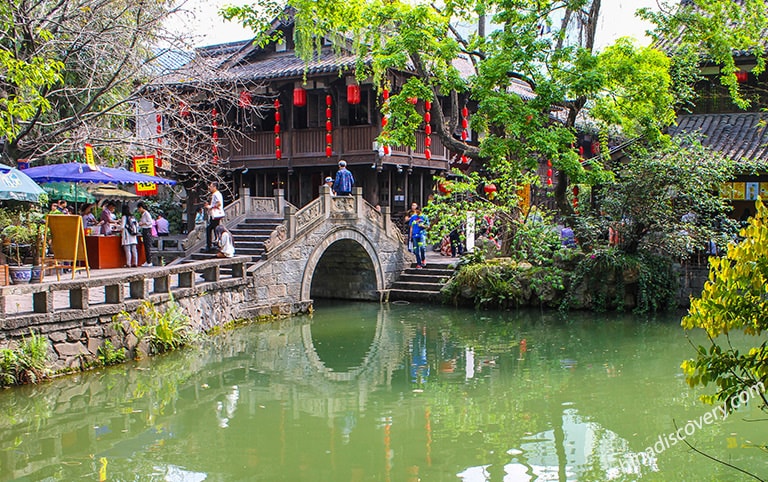 Beautiful Jinli Old Street Shot by Our Customer Rick
Beautiful Jinli Old Street Shot by Our Customer Rick
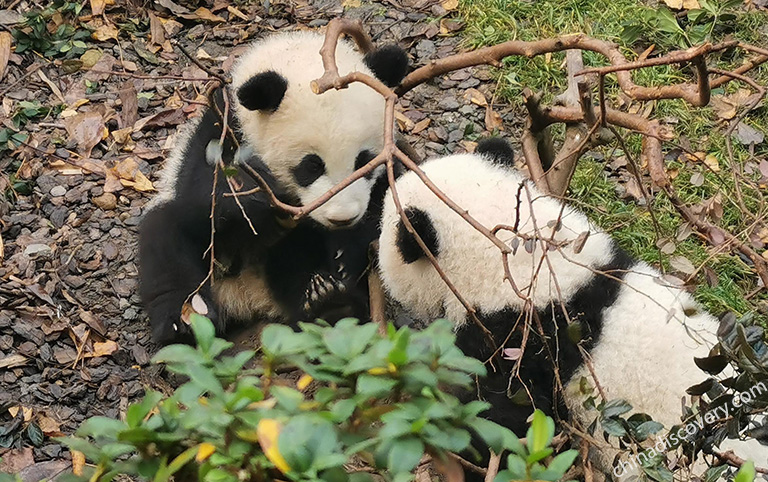 Giant Pandas Enjoying Leisure Time Together
Giant Pandas Enjoying Leisure Time Together
Chengdu is famous for Giant Pandas and its idyllic slow pace of daily living.
During this trip, your tour guide will company you to explore the top recommended attractions in Chengdu one by one to experience its authentic culture and history. First of all, take an exciting visit to Chengdu Research Base of Giant Panda Breeding. Then move to Renmin Park to enjoy a cup of traditional Chinese tea in the Renmin Park; Learn about Buddhism culture in Wenshu Temple; Experience traditional Chengdu life in Jinli Old Street...
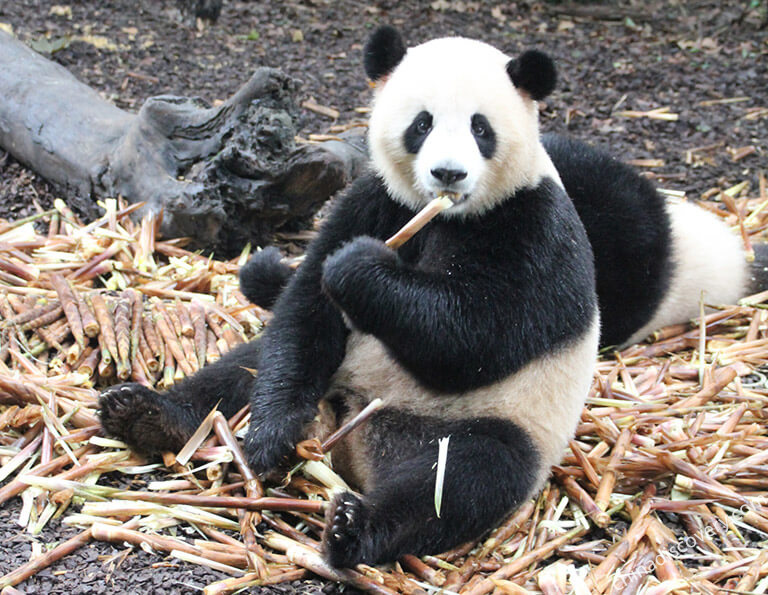
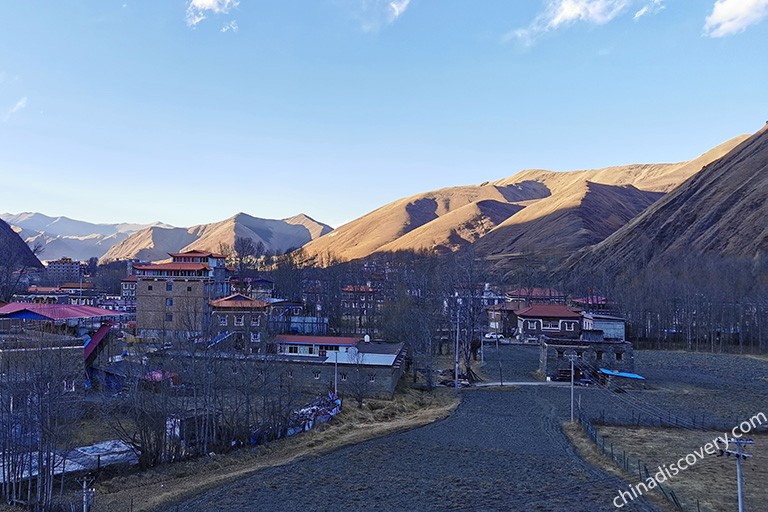
Chengdu / Dujiangyan / Mount Siguniang / Danba / Tagong / Xinduqiao / Hailuogou / Chengdu
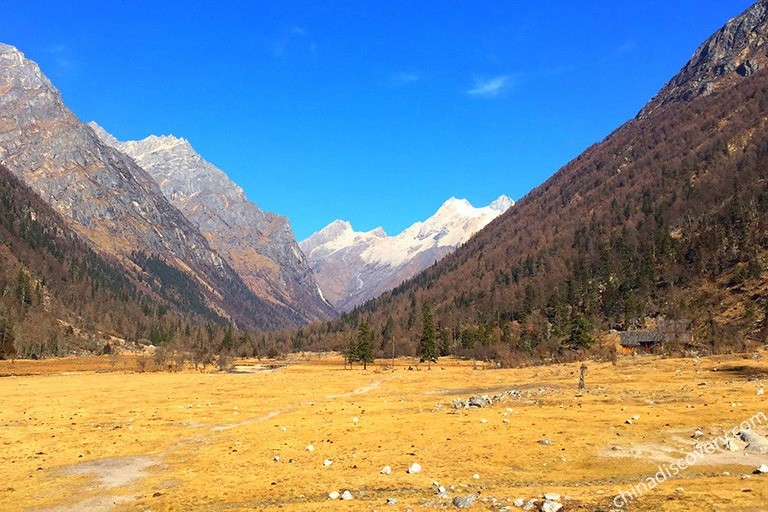
Chengdu / Mount Siguniang / Danba / Tagong / Xinduqiao / Leshan / Emei / Chengdu
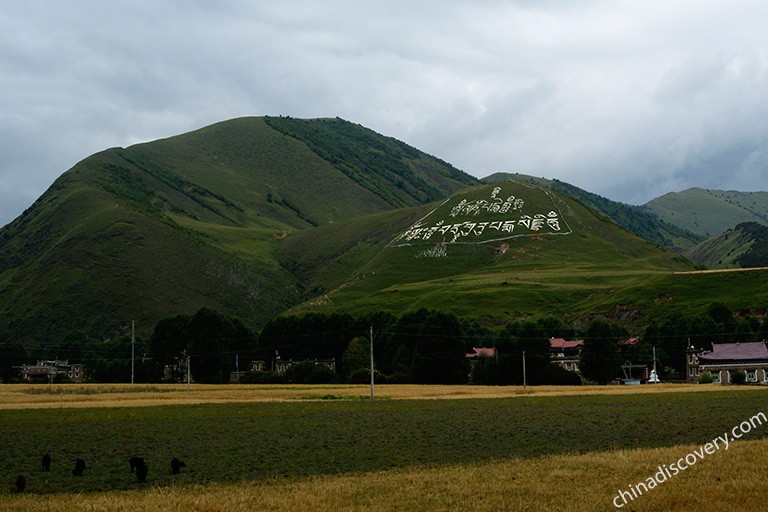
Chengdu / Wolong / Mount Siguniang / Danba / Tagong / Xinduqiao / Kangding / Chengdu